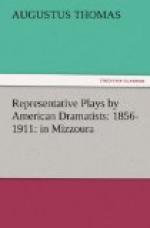I doubt if the production of novels, even to the writer temperamentally disposed to that form of expression, is as absorbing as play-making. The difference between the novel and the play is the difference between was and is. Something has happened for the writer of the novel and for his people. He describes it as it was; and them as they were. In the play something is happening. Its form is controversial—and the playwright, by force of this controversy, is in turn each one of his characters, and not merely a witness of their doings. When they begin to take hold of him, their possession is more and more insistent—all interests in real life become more and more secondary and remote until the questions in dispute are not only decided, but there is also a written record of the debates and the decision.
By the time our train pulled into New York, I was impatient to make a running transcript of speeches of my contending people. But that is a relief that must be deferred. Like over-anxious litigants, the characters are disposed to talk too much, and must be controlled and kept in bounds by a proportioned scenario, assigning order, and respective and progressive values to them. That was the work of a day by that time, and then, with the material gathered, and the intimacy with the people and the places, the play was one that wrote itself.
AUGUSTUS THOMAS.
[Footnote 1: The Witching Hour; Mrs. Leffingwell’s Boots; The Earl of Pawtucket; The Harvest Moon; Oliver Goldsmith [Published by Samuel French].]
[Footnote 2: Written before the death of Mr. Goodwin.]
=HOOLEY’S THEATRE,=
TWENTY-THIRD SEASON
R.M. HOOLEY Proprietor and Manager.
HARRY J. POWERS Business Manager.
* * * * *
COMMENCING MONDAY EVENING. AUGUST 7th, 1893.
Every Evening and Saturday (Only) Matinee
MR. NAT C GOODWIN
AND COMPANION PLAYERS




